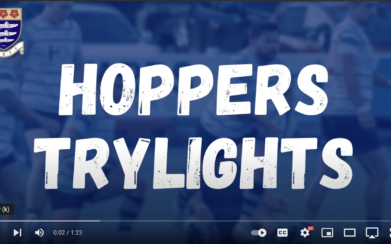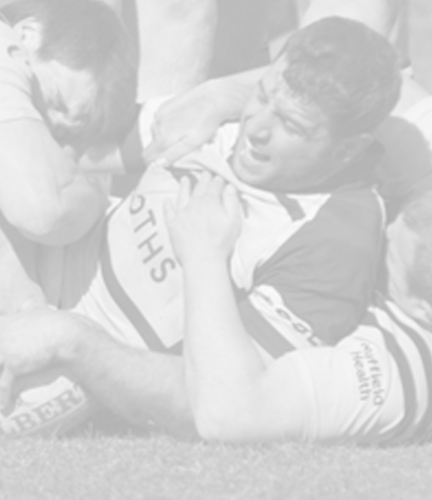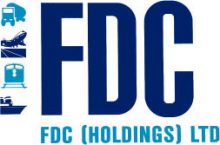Rugby Football Union
A Paper for Preston Grasshoppers RFC
Governance and other issues
Who we are
Preston Grasshoppers was founded in 1869. We play in National League 2 North (Level 4). We have only been out of the National Leagues for one season, gaining promotion the season we were out.
We run 6 senior sides, two Colts teams, a Ladies team and have nearly 400 Mini Junior players at all levels.
We own our own ground of over 30 acres. It is a continuous struggle to generate funds to do what we do and maintain our facilities.
We receive no funding from the Rugby Union save for limited travelling expenses, insurance and the cost of referees for the first team.
We have over the years produced a number of England Players including Wade Dooley, Will Greenwood and Paul Grayson.
Our Second team won their league last season. We are committed to player development and are both a National League club and a Community Club.
We are a Company Limited by Guarantee and are Registered under the Industrial and Provident Act.
Background
- We find ourselves in a position in which we would not have chosen to be following the way that the move from Amateur to Professional was handled.
- The whole game is now ostensibly professional within the means of those employing players.
- There have been some spectacular failures as a result with clubs up and down the land borrowing money to pay players with no reasonable expectation of earning enough to cover those payments and suffering as a result. Some by going out of business and others resulting in much reduced circumstances.
- Rugby in recent years has enjoyed a resurgence and interest in the international game has resulted in significant sums being generated by International gate receipts and television revenues.
- Much of that money has been spent in redeveloping Twickenham which has proved a good commercial exercise save that £30/40m has still to be repaid.
- Much of the money generated has been spent on growing the bureaucracy at Twickenham, setting up the England Coaching arrangements at all levels and paying money out to the clubs. Initially that was done at all national club levels but now is restricted to The Premiership and the Championship with some small expenses to levels below.
- The unrestricted and unconditional change to professionalism resulted in England having to pay players when they played for England and in players being contracted to play on increasing salaries for autonomous clubs largely funded by rich individuals.
- Those early professional clubs soon came into conflict with the RFU over availability of England Qualified players. Currently there is an agreement with the Premiership clubs which governs the availability of England Qualified players in exchange for substantial compensatory payments to those clubs releasing players. In addition the RFU have to pay the players for appearing for England. That agreement with the Premiership clubs is still in place. I have not seen a copy of the agreement but inter alia it prevents the RFU from setting up clubs or teams in competition with the Premiership.
- The influence of the Premiership clubs over the RFU is considerable and despite the Agreement I believe the RFU remain on the back foot.
- Only two of the Premiership clubs make a profit. The remainder are sustained by rich owners despite the huge sums given to the Premiership clubs by the Rugby Union. It is believed the same applies to the Championship. The revenue from Premiership and Championship television rights is, I believe , small in comparison with International television rights.
- The premiership clubs spend their money on purchasing players many or possibly most of whom are not qualified to play for England. Recently clubs at level 3 and below were precluded by the RFU from employing overseas players , subject to marginal concessions. There is therefore a difference in approach by the RFU to the amateur/ semi amateur clubs and the two top levels.
- We should cast an eye on what has happened to the Professional Soccer game in this country. Premiership clubs reign supreme (or some do). Many are owned by overseas interests. Some sides contain no England qualified players. Lip service is paid to the needs of the England International game or the grass roots. The purchasing power of the top teams in the premiership far outweighs that of the England Brand. Wembley was rebuilt by the FA at huge expense and the FA do what they can to extract money from the clubs by ,for example, staging FA cup semi-finals at Wembley. They still owe a small fortune to the banks. Is that the way we want rugby to go?
- Whilst the RFU are willing to prevent clubs at level 3 down from paying overseas players they are not prepared to rule that levels 3 down should be amateur. It is argued that “it wouldn’t work”. It certainly didn’t in the past but times have changed. HMRC is computerised and the risks of making illegal payments to players are now much more serious. HMRC are targeting clubs who pay players with a view to penalising clubs who make payments without paying tax or NI.
- The RFU also operate a different approach so far as club insolvency is concerned. It is manifestly unfair that clubs from level 3 down who fail have to go back to the bottom of the league structure whilst those in the Championship or indeed above can do a phoenix and carry on much as before whilst shrugging off all except “rugby debts”.
- The semi amateur clubs are increasingly finding it difficult to generate sufficient funds to pay players out of funds available. Those who do find it difficult to get volunteers to do all the jobs that were happily done by volunteers in the past. Very often they pay players at the expense of ground and building maintenance and resources for junior sides.
- PGRFC in recent years had significant borrowings which are now happily being reduced. Not all that borrowing was used for infrastructure. Much was spent on players. Those and future resources could have and should be spent on improving the facilities for all teams. We would dearly like to have a 3G pitch and more lights.
- If there were no “market “ for players to be paid at lower levels would players give up, play less well or not try as hard? In the days of amateurism games were no less competitive and with a strong County structure there were the means for players to progress and play at a higher level on merit. The current league structure provides that incentive which should not be dependent on players being paid to play.
- The England Union and the French Federation are the two richest Unions and yet are the only ones not to have centrally contracted players. They both missed a trick and remain on the back foot. French clubs have much lower overheads than English clubs as most play in Municipally owned Stadia. They get large gates and lavish money on players very many of whom are overseas players. Both countries suffer from a shortage of home grown talent. England more so than France.
Possible Way Forward
- 1.The Rugby Union should start to contract international and potential international players centrally and grow the current problem out of the system. They could then control when and how often players play for clubs.
- Require that all clubs from level three down are amateur and police it. Give generous expenses for travel, coaching, facilities etc to enable clubs to provide a competitive and challenging environment in levels 3 and 4.
- Ensure that the funds generated by the England brand game and television rights are concentrated on England Qualified players’ development, on academies or on improving club facilities and coaching at all levels rather than being used as a pension fund for overseas players.
- Ensure the game is governed for the good of all players at all levels and do not allow it to be hi jacked by the Premiership and Championship clubs.
- Learn from the way football has gone. Avoid player burn out by restricting the number of games they play.
- Learn from the London Welsh debacle. Review the agreement with Premiership clubs to ensure that the playing field really is level. Resist Ring Fencing the Premiership and Championship.
Corporate Governance
- Currently there are 3 Constitutional bodies within the RFU.
The Board which has general powers of management.
The Council which has some management responsibilities and the right to veto certain decisions.
Members in General Meeting.
- Members clubs (Members) elect the President and Chairman of the Board from Council Members and Privilege Members (venerated persons ). Members cannot remove Board Members.
- The Council members are elected by the Member Clubs affiliated to Constituent Bodies. In our case Lancashire RFU. Historically those were powerful bodies whose members came from senior clubs. Now most Constituent Bodies are made up of members from mainly junior clubs. Some members of the Council are appointed by National Representative Bodies, others are ex officio and some are co-opted.
- The RFU aspires to be governed to PLC standards. There are various guiding principles or codes of practice including the UK Corporate Governance Code and the recent Sport Code to which the RFU subscribe.
- Better Governance is likely to result in more accountable and effective decision making but it cannot ensure that better decisions are taken. Governance must be kept under constant review and should have a formal review for presentation to the Council every four years as is recommended in the S & L report.
- There is a general recommendation for consultation and publication of decisions voting records etc
S&L Recommendations
Membership Chap 4
- Individual adult membership is suggested as being most democratic and representative rather than clubs. RFU should undertake a feasibility study. Not sure this is a good idea. How would votes be weighted? For instance all Leicester Members could skew voting.
- Otherwise criteria for membership should be relaxed. Tag rugby rather than Senior adult XV should suffice. Again not convinced.
- Limited Liability structure for member clubs recommended as should mechanism for exercising RFU vote. Fit and proper person and financial soundness requirements recommended.
- Schools should not be Members but continue as members of ERFSU.
- Universities etc can be Members but not Constituent Bodies, National Rep Bodies nor Council Members who should all nevertheless be bound by Rules Regulations Laws and IRB Regs.
- Abolish non voting membership. One Member one Vote to be cast in best interests of the RFU.
- Membership criteria and continuance, refusal etc to be executive decision subject to Board.
- Twickenham Ticket entitlement to be phased out; sale to be executive decision under Board with Council having no say. Not a good idea. Tickets are means of rewarding Club supporters/volunteers and raising funds.
- Align grounds for calling general meetings, agendas etc with Companies Act . Reduce quorum for general meeting to two.
- Special Resolutions to have 20% or more of membership in favour in addition to two thirds of Members who vote. Postal voting, Proxy Poll electronic voting and open ballot to be used. Records of voting kept and posted on website.
- Each General Meeting to be adjourned from place to place and to visit all regions.
- Powers of Members in General meeting to be increased. Advisory vote on remuneration, ratifying Board appointments and approving auditors remuneration. Power to direct Board to take or refrain from taking specified action, power to override veto of Council and power to remove member of Board (but not of Council)
- President senior and Junior Vice President to be elected by hustings by Council not by Members.
- Members should not elect Chairman of the Board. Should be elected by Board other than executives or chairmen of Community and Professional Game Boards (CGB and PGB)
- Reporting to be in line with UK Company requirements. Annual Report to contain record of all attendances of Council, Board and Committee meetings. Remuneration Report to be part of Annual Report. To include all remuneration, benefits privileges and expenses of Board, Council and Committee members and all others receiving any such. Policies on benefits etc to be approved by Members in General Meeting.
- Rugby Heroes recognition policy to be clearly set out subject to Members approval in General meeting rather than obscure old pals act arrangements .
- Much wider publication on website of reports from Chairmen of Council CGB, PGB and Committees, Membership of committees with Bio details election processes etc.
- Introduce an Asset Lock.
Council Chap 5
- Primary Function should be to monitor and oversee the Board on behalf of Members.
- Otherwise be a forum for debate by stakeholders, be fount of wisdom, provide candidates for certain positions, act as ambassador s and disseminators of RFU vision.
- Owe duty of loyalty to RFU and should not initiate or veto executive decisions.
- Board manages RFU whose strategy should be worked up by them for approval by the Council.
- Current executive powers vested in Council should be removed (eg to determine all new or changes to policies re playing, governance or regulation of the game)
- Council should approve Strategic Plan, Significant Transactions and change in terms of reference for Nominations Standing Committee, Remuneration Panel, The Audit and Risk Committee and the CGB. ( The PGB is seen as a contractual joint venture and the Board alone should have control over appointments and variation of the contractual arrangements). Not sure this is a good idea. Would prefer to see Council have oversight of changes to the contractual arrangements with the Professional game.
- Council should elect 3 of 11 members of the Board, 5 of 10 members of the CGB. Only one office per Council member.
- New role of Council Chairman to be elected by Council. Comes with Secretary. Three year term. Max two. To Chair Council Meetings.
- CEO CFO Chairmen of CGB and PGB to report quarterly to Council and attend Council meetings. Auditors to present annually and senior executive team to present on rotating basis to Council. No entitlement to receive Board Minutes or see RFU books and records.
- Members of Council elected by Constituent Bodies to be reduced to 25 from 44. Three year terms. Maximum three terms to be applied retrospectively. Five regions each elect 5 members. Regions to have roughly equal number of Members. One of five to be from under-represented group. Perhaps over the top. All subject to review and supervision. County Constituent Bodies would no longer be basis for representation. They would be “free to concentrate on their operational and administrative functions”.
- Following appoint members to the Council: ERFSU 2 Student RFU 2 and English Colleges 1 (What is the distinction?) ( No Oxbridge Reps) Services 1 between them Referees RFRU 2 Rugby Players Association. 2 Clubs at Level 1 2 Clubs at Level 2 2 Clubs at levels 3 & 4 1 between them.
- Limited power to co opt 4 on recommendation of Nominations Standing Committee.
- Current Council 63 Positions filled by 60 Members. Proposed new Council 40 with power to co opt another 4.
- Changes to composition of Council to be approved by Members in General Meeting.
- President s v p and j v p to be elected from Council. Term one year. No return within 5 years. President chairs General Meetings. Abolish position of Past President.
- Council members to be trained, inducted and appraised as should all other positions. Quarterly meetings. No Alternates for Council or Board. Decisions by open ballot. Records of votes and voting on website.
- Council Standing Orders to be abolished and relevant bits taken into the Rules.
- Council members receive no remuneration but do receive benefits in the form of Tickets( home and away), travel subsistence and Hotel expenses set out in detail in Appendix 1 of the Report.
- There is a CAP scheme whereby employers can recover from the RFU compensation for time spent away. This includes self employed persons.
- Costs of Council for administering the game in 2011 were £0.6 million. That did not include all costs in maintaining and supporting the Council including opportunity costs such as complimentary tickets and travel expenses nor those benefits conferred on Past Presidents or Privilege Members nor payments under the CAP scheme. It was not possible to isolate those costs from the annual report.
- Recommendations: Scrap CAP scheme but revisit if talent pool shrinks and results in dilution of skills. There should be a tariff of expenses published on website and Annual Report should contain audited information about remuneration benefits and expenses of each member of the Council, the Board, all committees and any others to whom benefits and Privileges are given and should be laid before members at each AGM together with details of attendances at meetings.
The Board and Committees Chap 6
- “The Board should exercise all powers of RFU subject to specific and precise reservations to the Council and to the Members in General Meeting.” Presumably only those matters referred to at 6 Council above.
- Terms of Reference to the Board to be abolished. Clear definition of reserved matters which cannot be delegated to the Exec to be drawn up.
- Constitution. 11 Members: 3 Execs: CEO CFO and another of Senior Executive team appt by Board. Chairmen of PGB and CGB ex officio, 3 Non Execs elected by and from the Council and 3 outside independent non exec Directors appointed by the Board on the recommendation of the Nominations Standing Committee. No place for RFU Rep to IRB or for President.
- Chairman to be elected by Board from Council Members or outside directors.
- Board to delegate to CEO power to apt RFU reps to IRB, Six Nations and British and Irish Lions.
- Governance Standing Committee to be abolished.
- CGB to elect its own Chairman (not appt by Council). Chairman of PGB to be apptd by Board from Council.
- 3 Year terms for Board Members no more than 3 terms except for Execs .All appts to be ratified by Members in General Meeting. Board Members to be trained, inducted and appraised. Board to elect senior outside director from independents.
- Senior Execs should attend Board meetings as observers. Council members only by invitation. Meetings to be held in each region each year preceded by open meetings.
- RFU to abolish all committees except : CGB, Nominations Standing Committee, The remuneration Panel and the Audit and Risk Panel. The latter three should become committees of the Board not the Council.
- Committee structure seen as expensive and dilatory. An example was quoted of approval for Age Grade Regulations which involved 13 meetings of 9 separate decision making bodies conducted over 11 months.
- RFU to consult widely on changes to game its admin or regulation or on Governance.
- Terms of reference for CGB by Board to set out powers , responsibilities and constitution and to go to the Council for approval.
- CGB to consist of 10 members. 5 Members of CGB to be appointed by CEO from executives to include Rugby Development Director and someone who knows the women’s game and 5 elected by and from the Council one from each region. (three year terms for elected members; max three terms).
- PGB to have permanent observer on CGB reserved for member of PGB apptd to PGB by Levels 1 or 2. Can speak but not vote. If Contractual arrangements with PGB are reviewed suggested CGB be given a reciprocal role.
- Nominations Standing Committee. Currently 5 members 4 Council 1 Past Pres. Unclear how it is appointed. Recommendation: 5 members to be appointed by the Board from the Board and its Chairman should be the Senior Independent Director. The Chairman of the Council should be an additional ex officio member but with no vote.
- The Audit and Risk Committee is currently made up of 4. 2 from the Council one is a former member and one an external individual. Recommendation: should be appointed by the Board from the Board. Should undertake review of Internal Audit Function and Risk management and bring into line with current best practice. Whistle blower policy should be adopted and published on website.
- The Remuneration Committee is currently made up of 5 . 4 Council Members and one external Head of HR attends in non-voting capacity. Recommendation: appointed by the Board from the Board and should comprise Independent non exec Directors and possibly Chairman of the Board. Needs to be brought in line with current best practice.
- No remuneration for Council Members. Full details of all Remuneration etc in Annual Report for approval by Members.
The Professional Game Chap 7 The Elite Game
- The Professional game is International Rugby and Levels 1 and 2. The PGB the body at which professional rugby issues are considered by the RFU includes representation of levels 1 and 2 only.
- The relationship between PRL the Level 1 clubs and the RFU is governed by the Heads of Agreement. The RPA and Level 2 also had input into the terms of this agreement which sets out the terms of reference of the PGB and its composition. Namely: RFU appointed Chairman, four further RFU Reps, 4 PRL Reps, 2 RPA Reps and one rep from Level 2. The Board appoints the RFU reps who serve 2 year terms but can be reappointed.
- Terms of ref and functioning of the PGB are set out in the Heads of Agreement and can’t be changed by the RFU unilaterally.
- Recommendations: Rugby Operations Director and CEO should be two of RFU Reps but not ex officio. Chairman of the Board should not be chairman of the PGB. The chairman of the PGB and the other 2 RFU Reps should come from the Council on recommendation of the Nominations Standing Committee.
- Heads of Agreement provide for CEO of PRL and Chairman or CEO of each Level 1 club to attend Rugby Strategy meetings of full RFU Board with reciprocal meetings with PRL. One of each per year. Suggested invite Level 2 Clubs also. Talk talk is better than war war.
- A rep of Level 1 should be appointed to board of Rugby World Cup 2015.
Discipline Chap 8
- All rules etc re Enforcement of the Laws of the game, the IRB Regulations and RFU related policies should be set out in the Regulationsto be developed by the exec under supervision of the Board, independent of the Council with input from CGB and possibly PGB.
- All matters relating to governance should be in the Rules only to be altered by Members in Gen meeting.
- RFU Disc Powers vested in Board not the Council with delegation to exec, volunteer disc officer or Constituent Bodies. RFU to ensure powers exist to enforce Disc.
- Disc panels should be seen to be independent of RFU
- Model engagement letters for Council members and Non Exec Directors. Codes of conduct for Employees, volunteers and Council Members with disciplinary powers.
Confidentiality and Conflicts of Interest Chap 9
- RFU should have a confidentiality Policy for all officers and employees, should develop a protocol to identify which information may be made available to whom, should not mark information as “confidential” “restricted access” etc unless absolutely necessary, should have a separate media policy applying to all officers and employees and breaches should be vigilantly pursued with sanctions imposed.
- There should be a more robust policy on conflicts of interest to apply to all officers and employees.
- RFU should seek to ensure its reps on other bodies are free to act in best interests of the RFU. If not then that individual should not vote on an RFU body re a relationship with that body.
- No personal retention of emoluments derived from their office. All benefits to be declared and conflicts or potential conflicts recorded and all gifts hospitality etc recorded. Breaches to be policed and sanctioned.
Constitutional Documents and Form Chap 10
- The Rules should contain all matters relating to Governance. ( will need some Regulations and Council Standing Orders to be moved there)
- Rules only altered by Special Resolution of Members in General Meeting.
- The Regulations should set out all other matters eg admin of game. Board alone to have power to amend with involvement of CGB and PGB.
- Those responsible for Discipline should recommend to Board changes to Regulations relating to Discipline.
- The Objects of RFU currently in the Rules not in line with current strategic priorities and should be amended.
- The borrowing limit should be brought in line with best practice and build up of debt inherent in RFU Debenture programme should be addressed.
- Indemnity in favour of broad range of current and former employees and officers goes well beyond what would be permitted by the Companies Act and should be brought in line with best practice for listed companies.
- There is no need to change current Corporate Structure. i.e Company Limited by Guarantee Registered as a co-operative society under the Industrial and Provident Society Act.
Conclusions
I believe the report is a good one. It clarifies separation of responsibilities and hopefully will streamline decision making. It moves away from an overblown Council and ponderous committee structure and has, in my view, sufficient checks and balances for common sense to prevail and , if implemented, will enhance and achieve transparency and make the organisation more accountable to the Members.
I would disagree with the following recommendations:
1.Not convinced that individual membership is the way forward. Could run risk of hi jacking by pressure groups. Disagree with suggested dilution of membership criteria. Eg Running a tag side only might qualify.
2. Don’t believe Twickenham tickets should be marketed to highest bidders. They are a valuable source of benefitting club volunteers. No objection to market setting sale price but distribution to clubs should continue.
3.The Council should have a say over revisions to the Elite Game Heads of Terms and dealings with the PGB.
4. Not sure that 5 of the 25 elected Council members ( one in each region) should be earmarked for under represented minorities. Could use Co optative powers to redress any balance post election.
George Erdozain
Chairman Preston Grasshoppers RFC
Revised July 2012






































